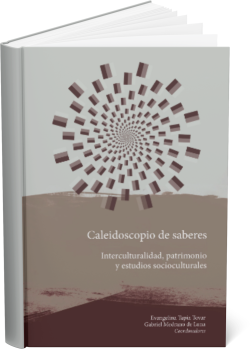KALEIDOSCOPE OF KNOWLEDGE: Interculturality, heritage and sociocultural studies
Synopsis
This book is a collective effort to show an overview of the new scenarios in which interculturality, cultural heritage and sociocultural studies are experienced, based on different approaches to the roots of social meanings, which guide daily actions in the face of everyday problems and social networks that help or hinder the ways we relate to each other, recognizing the social and cultural diversity that favors the dialogue of knowledge that enriches the cultural heritage. Likewise, it presents some educational experiences, from different scenarios, oriented to the recognition of interculturality, in order to favor respect for all manifestations of cultural, social and gender diversity.
Throughout the pages of this work, the benefits and potentialities of interdisciplinary and transdisciplinary approaches for the analysis of interculturality, heritage and daily life are shown. The thematic, theoretical and methodological plurality of the contributions that integrate each one of the chapters of the book corresponds to the confluence of the characteristic approaches of gender studies, folklore, linguistics, literature, communication, pedagogy and philosophy, in addition to some reflections that drink from the decolonial perspective and sociocultural studies.
Chapters
-
Cultures and social action
-
Presentation
-
Chapter 1Sociocultural problems of everyday life
-
Impact of covid-19 on day-to-day business 2020-2021
-
Citizen participation: the case of self-defense groups in Mexico
-
Harassment and sexual harassment in rural teacher training schools in Mexico. Reflections from a sociocultural perspective
-
Analysis of ecclesiastical masculinity from the perspective of decolonial studies.
-
Romantic love in adolescent motherhood.A matter of gender and culture
-
The life trajectories of the graduates of the State Center for Adolescent Development
-
Chapter 2Dialogue of intercultural pedagogical experiences
-
Art and science to imagine, coexist and create: magical childhood in Suchitlán
-
Didactic materials for intercultural science education.Co-production of materials on literacy in a network of teacher-researchers
-
Beyond academic mathematics
-
Use of documentary films as didactic material to establish a dialogue between local and universal knowledge.
-
Chapter 3Ethical, epistemological and methodological debates from an intercultural perspective.
-
Model research project
-
Autoethnography: weaving intercultural knowledge with diversity
-
Axiological positions of children in marginalized areas.
-
From the visible to the invisible: presence of indigenous students and graduates in Facebook profiles of public universities in Mexico.
-
Methodology to make minority and excluded groups visible in the context of the Universidad Autónoma de Nayarit.
-
Construction of the spatial repertoire in the classroom: the interrelation of repertoires, practices and space at the Universidad Autónoma de Nayarit.
-
Chapter 4Languages, literatures and intercultural educational contexts
-
Reflections on the mother tongue in poetry written in the indigenous languages of Mexico.
-
Reflections on intercultural bilingual education in Mexico within the framework of “superdiversity”.
-
Contact relations and isolectal perception in the linguistic dynamics of the state of Colima.313-330
-
Theoretical and methodological approach to the use of honorifics in the health of the nahua-speaking population of Guerrero in Colima.
-
Chapter 5Approaches to diversities and stigmas from cultural studies.
-
The configuration of disability identity in the conflicting scenario between the heteronomous version of cultural models and the internalization of identity in people with disabilities.
-
Citizenship and diversity in-children's key
-
Diversity and stigma in mental health.
-
Speciesist practices and their connection to other forms of oppression and exclusion
-
Racism of intelligences as a distinction generated in the school experience: an approach from the point of view of high school students in Colima.
-
Senses and rhetorics of diversity: tensions from the governmentality of gender identities.
-
Chapter 6Heritage, folklore and interculturality
-
Unities and diversities in the field of folklore
-
The Interrupted Dialogue: Vicente T. Mendoza, Oreste Plath, Jorge Negrete and Juan Santiago Garrido
-
Iconography of some cities, brushes and pencils that represented them
-
Heritage and interculturality observations at the Barefoot Museum: relationship of the object and the subject.
-
Flashlight projections, the fantastic is in the look
-
Voltaire and culture (finding tools against post-truth)
-
Literary landscapes and literary road in Mexico and Colombia.A great opportunity for the development of cultural tourism

Downloads
- Caleidoscopio de saberes.pdf Caleidoscopio de saberes.pdf
- 563-586.pdf 563-586.pdf
Published
Series
Categories
License

This work is licensed under a Creative Commons Attribution-ShareAlike 4.0 International License.













